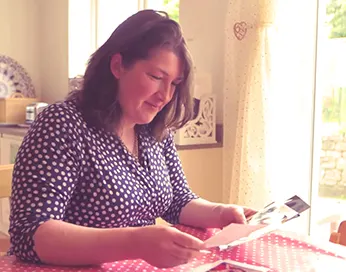
 Endorsed by - Nicola Travlos, founder of Invictus Pelvic Health and NHS pelvic health physiotherapist. Nicola is also Over The Bloody Moon’s Pelvic Health Advisor.
Endorsed by - Nicola Travlos, founder of Invictus Pelvic Health and NHS pelvic health physiotherapist. Nicola is also Over The Bloody Moon’s Pelvic Health Advisor.
This content has been brought to you in collaboration with Menopause experts and clinicians
Always Discreet, is on a mission to empower women so that they can manage their menopause symptoms with confidence. They’re teaming up with Menopause experts, Over the Bloody Moon, to help equip and inform women as they embark on the next stage of their life.
Why investing in pelvic health is an essential part of women's health
Pelvic health is one of the areas of women’s wellbeing which is affected by the menopause transition, and simply doing pelvic floor exercises alone everyday will not solve all your pelvic health issues. Good health in the pelvic area requires a multifaceted approach.
Women in this phase of life are usually juggling a cocktail of career, aging parents, relationships, and children. This, plus doing too little exercise or too much of the wrong type of exercise and eating a low-fat diet, coupled with fluctuating hormone levels, can exacerbate your symptoms.
For example, prolapse is often an issue that has been around for some time due to chronic constipation, childbirth injury, over-exercising, under-exercising, heavy lifting, or because, genetically, you have the type of tissue that is quite stretchy. Bring on perimenopause and postmenopause, and it becomes more symptomatic due to the hormone fluctuations and changes in the surrounding musculature and supporting structures.
Warning signs for poor pelvic health
-
urinary frequency – feeling like going to the loo several times a day and at night
-
stress and urgency incontinence – bladder leaking with coughs, sneezes and activity, and not getting to the loo in time
-
prolapse – movement of the pelvic organs into the vaginal canal
-
pain with intercourse
-
vaginal atrophy – thinning of the tissues
-
constipation and faecal incontinence, as well as wind incontinence
-
back and hip pain
The Science
Symptoms can start with fluctuating hormones in the perimenopause (several years before menopause) such as:
-
a relative reduction in progesterone resulting in poor sleep, anxiety, and aches and pains
-
oestrogen dominance resulting in hot flushes, breast tenderness, anxiety and weight gain
-
oestrogen depletion as menopause (i.e. 12 months of no periods) grows closer, causing vaginal dryness, atrophy (thinning of the tissues), bladder irritation and incontinence
-
reduction in testosterone affecting libido and comfort during sex amongst other symptoms such as energy, bone density, and muscle mass
How to practice good pelvic self-care
The power of the breath
Breathing is a wonderful way to start you on your self-care journey. Take a few minutes each day to breathe and expand your ribs and your breathing muscle, your diaphragm. This will not only calm your nervous system, reduce the stress hormones, and help your digestion and absorption, but will also mobilise and nourish your pelvic floor. Your pelvic floor and diaphragm work together in synergy, and breathing is a great way to reconnect this essential relationship.
Mind management
Good pelvic health requires attention, not only to your pelvic floor muscles, but also to your self-care strategies. These include sleep habits, sleep hygiene, and mental health and stress management. It requires joyful connection with nature, friends, family, and creativity.
Strategic Nutrition
Healthy eating is a big contributor, with diets including protein, plenty of fibre, good fat, good carbohydrates, and supportive supplements. It’s essential to find the right type of exercise/movement that suits YOU as an individual and that is sustainable and enjoyable. Be guided into how to build up and train to the level you require to allow for pressure management, which is essential for good pelvic health and management of prolapse and incontinence.
Specialists and support tools
Seeing a pelvic health physio is one of the first steps to take to evaluate your pelvic floor and general health. A pelvic health physio can check your symptoms, and is specially trained to examine your pelvic floor and teach breath coordination and pelvic floor training, including down-training, if you have an overactive pelvic floor.
If you are experiencing incontinence or prolapse your physio can help you to manage these symptoms. They can also recommend and help you to understand when it is appropriate to use biofeedback devices, such as Elvie or Kegel 8, or neuro-stim machines that teach you how to feel and move your pelvic floor muscles. They will recommend when to use apps, such as the Squeezy app to uptrain your pelvic floor.
Depending on what type of incontinence you are suffering from, there are products that can help. Incontinence products are designed for sensitive bladder and offer varying levels of protection. They are available in liners, pads and pants.
Your physio can teach you pressure management strategies, correct lifting techniques, as well as sleep hygiene, stress management, healthy eating, and movement to complement your exercise needs and hormone balance.
It can seem overwhelming to try and fit all this into your schedule, and we will work together to support you to integrate these actions into your life in a manageable way, one small step at a time.
Always Discreet are products for incontinence - a symptom you might experience during menopause. If you have concerns about menopause or incontinence, please consult your GP



